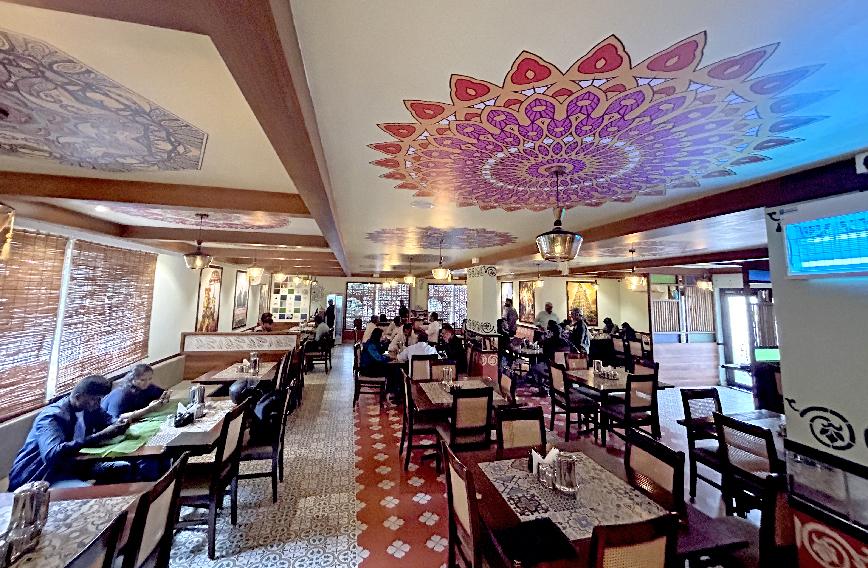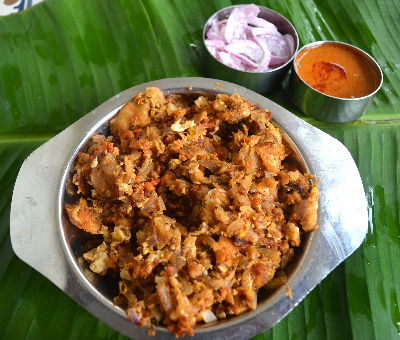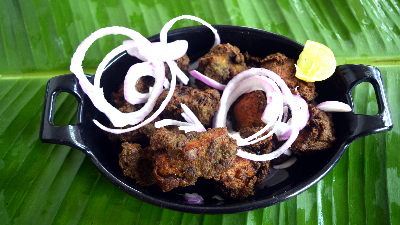
A Pandyan meal to perfection
Susheela Nair
As I stepped into Suvaii restaurant, I noted it had the warmth and ambience of a typical elegant Madurai Chettinad home. This set the stage for an unforgettable dining experience of Pandyan cuisine. As I made my way through Suvaii’s sparsely decorated interiors, I was welcomed by framed art gracing its walls depicting Jallikattu, the Meenakshi temples, costumes, martial arts, the Chithirai festival, the Thirumalanaikan Mahal, and other scenes typical of Madurai.
The unpretentious interiors draw inspiration from the traditions of Madurai and the Pandyan dynasty and reflect the traditional architecture of the Madurai Chettinad region. The Athangudi tiles for flooring and wooden pillars are also typical of Madurai. One of the things that caught my attention was the tastefully done ceiling with exquisite Kolam art. Even the furniture and lighting complemented the Madurai concept beautifully.
Suvaii, which means taste in Tamil, stands as a testament to the rich culinary heritage of the Pandyan dynasty, one of Tamil Nadu’s prominent ancient dynasties that ruled parts of South India. Pandyan-style food is characterized by its lavish use of locally available ingredients such as rice, lentils, coconut, tamarind, spices and meat.
“We take great pride in presenting the best of Chettinad flavours from across the land of the Pandyas that take you back to the 13th century. Our skilled chefs use only the finest ingredients and time-honoured techniques to craft each dish with precision and care. From the aromas of our spicy curries to the delightful richness of coconut, each dish is a tribute to the legacy of the Pandyas,” says Siddharth Ranganathan, one of the co-founders of Suvaii.
 |
| Civil Society picture/Susheela Nair |
Locally sourced ingredients are the backbone of the culinary offerings at Suvaii. Explaining why the food is distinctive, Ranganathan says, “Ingredients play a very critical role in ethnic food. For an authentic dining experience, the spices and ingredients are sourced from native regions across Madurai. We use wood-pressed oils, in-house ground spices, pounded masalas, fresh meat and sea food that are procured daily from the source itself. We do not use preservatives, tastemakers, MSG, refined oil, artificial colours, or processed food. We also pound our own masalas which significantly contributes to the taste and essence of our foods. Everything is about freshness and no stored food is used in our restaurant.”
The first thing that comes to my mind at the mention of Madurai food is the Kothu parotta. We relished this culinary masterpiece which is made by tawa-frying parotta, spices, meat and egg. With a wide range of parottas like bun parotta, poricha parotta, chicken chilli parotta and so on, Madurai is said to be the parotta capital of this region but the signature parotta is Kothu parotta which means chopped roti in Tamil.
For die-hard non-vegetarians, the mutton paaya soup made with lamb trotters boiled with the right mix of home-ground spices would be a nice start. But we gorged on other starters like mutton kola urundai (scrumptious mutton keema balls deep-fried with flavourful masala), the karuvapullai chicken fry (a South Indian appetizer marinated with curry leaves and chilli, deep-fried in coconut oil) and mutton chukka (small boneless mutton chunks roasted with freshly pound masala in gingelly oil).
There are other delicious dishes in Suvaii that are exclusive to Madurai, the culinary capital of Tamil Nadu. The elumbu roast, a rich flavourful dish where mutton is simmered in a spicy gravy and served with piping hot rice or dosa is another non-vegetarian delight. Made of tender goat, the mutton chukka is a big hit.
 |
| Civil Society picture/Susheela Nair |
Every bite of aromatic biryanis is a celebration of the rich cultural heritage of Tamil Nadu. Eight types of biryani are served in Suvaii. The mutton is sourced directly from Madurai. It is cooked with flavourful seeraga samba rice. We found the meat tasty and tender, served with a boiled egg. The onion raita was different and dry without the use of excess curd. The mini non-vegetarian meal comes with an assortment of dishes including mutton biryani, ghee rice, curd rice, parotta, chicken-6 and payasam.
Another bestseller is the in-house favourite, a three-layered Kari dosa. The bottom layer is a plain dosa, then an omelette and the top layer is a spread of spicy mutton keema. It looked like a pizza left to brown. We found it very filling and crispy. It is accompanied with mutton or chicken curry. It is said that Kari dosa was a treasured recipe of the Konar community of Madurai. The Konars were traditionally cow herders or Yadavs settled in Tamil Nadu.
Since most of the meats and ingredients are sourced directly from Madurai, it ensures freshness and authenticity. For instance, our Ayirai Meen Kolumbu, a special fish gravy, featured fish exclusively curated from Madurai and stored at a precise temperature. The unique aspect of this dish from Madurai is that the fish can only be cleaned while it’s alive, adding a distinctive touch to its preparation.
At Suvaii, the guest has the option of three different meals with no repetition. There is a specialized breakfast menu, an exclusive lunch menu and an exceptional dinner menu. You get plenty of choice so you never get bored with the meals served here. You can eat like a warrior at breakfast and choose from a range of idlis, dosas, appams and poori with your non-vegetarian curries.
Comments
Currently there are no Comments. Be first to write a comment!



